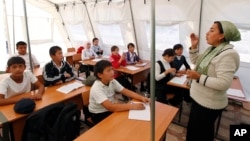Facing an increasing tide of female and young jihadists, the government of the Central Asian nation of Kyrgyzstan is turning to women for help.
The chairman of the State Committee on Religious Affairs, Orozbek Moldaliev, says women are more prone to adopt extremist ideas because they have been neglected in religious education and are suffering economically. For this reason, the government has started programs to teach educated women how to counter the extremism narrative and resist its lures.
“We will organize workshops and trainings for activist women,” Moldaliev said. “We expect that women who get these trainings will pass them on to others as well.”
The programs employ a large number of lecturers nationwide, including women from international aid groups, local law enforcement officers, and officials from the government. Among the key players are local “zhensovets” - women councils.
The meetings take place in public libraries, local city halls, theaters, schools and universities with female students, teachers, housewives and others in attendance. The lectures introduce the women to the values of traditional Islam, followed by talks unmasking the real face of extremism trough the stories of people. The women also learn about the state law on extremism.
According to the International Crisis Group, there are roughly 8,000 members in the radical Hizbut-Takhrir movement, about 2,000 of whom are women. The group recently issued a report called Women and Radicalization in Kyrgyzstan, highlighting a problem of growing extremism found throughout Central Asia.
No exact numbers
Analysts say the number of radicalized women in the country may be higher.
“We can only speak of estimates. I do not think anybody knows exact numbers,” Noah Tucker, the managing editor of Registar.net and an associate professor for Central Asia at The George Washington University, told VOA.
Women are among the prominent ranks of jihadists who have left the country to join Islamic State in Syria and Iraq. By Tucker’s estimate, around 300 IS fighters are from Kyrgyzstan, including women and children.
The issue of IS fighters from Central Asia is a continuous one, especially between Russia and its former Central Asian republics.
Russia’s main government-controlled TV channel, Russia 24, recently reported from Osh and said the region is a “source of IS manpower,” adding that many IS fighters from Central Asia are entering Russia disguised as labor migrants.
Russian security said this week that it detained seven suspected IS members from Central Asia who are accused of plotting terrorist attacks in Moscow and Saint Petersburg.
The Kyrgyz media have pushed back on the Russian reports, saying the majority of IS fighters are not being recruited in Kyrgyzstanin, but in Russia where they migrate for economic reasons.
But Kyrgyzstan's Ministry of Internal Affairs says that at least 508 people have left Kyrgyzstan to become IS fighters, 204 of them women and minors. Many come from Osh, a seat of radicalism in the region.
Appeal to mothers
According to rights groups and activists, women and children are subject to subservient roles in Kyrgyzstan, making them susceptible to radicalization.
“What can you expect from a woman who is uneducated and does not have a voice and rights in the family?” asked Kyrgyz author Salima Sharipova, who heads the “Mother Umay” party.
Matluba Musaboeva heads a Women and Girls Committee of Uzgan in impoverished Osh, which has been a fertile recruiting ground for IS. She says appealing to mothers might be an effective way to prevent young people from joining extremist groups.
“Nobody wants her children to get involved in wrongdoings,” she said. “However, we need more programs on these issues.”
Musaboeva says many Kyrgyz women are suffering from high unemployment and isolation, which make them vulnerable to jihadist recruiting.
Analyst Tucker agrees. “More devout, more educated Muslims in Central Asia usually are not the ones who join IS,” he said.
More than educational programs for women are needed to curb the jihadist lure, Tucker said.
Lack of education is not the only reason many people join IS in Syria and Iraq, analysts say. Socioeconomic factors also drive women and young people to leave Kyrgyzstan, they say.
“The ethnic Uzbek minority in the south doesn’t get government services in general,” Tucker told VOA.
The state approach toward women in Kyrgyzstan is more complicated than limited access to education and social negligence, government critics say.
In June 2013, the parliament passed a law banning all women under the age of 23 from traveling abroad without a male guardian.
Sharipova of the Mother Umay party says in such a male-dominated society, men are expected to come up with solutions for every problem. She said countering extremism among women is a man’s job.
“They should defend their homes, families, mothers, spouses, sisters, and daughters from threats. Family is like a motherland and a fatherland,” she said.
VOA’s Fatima Tlisova contributed to this report.




